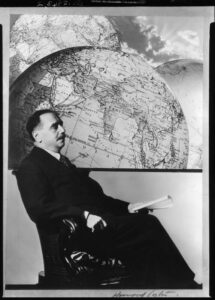

With all the pretensions of spiritualists… No great truth containing a benefit to humanity has ever reached us; no addition to our scientific knowledge has ever been made. A living seeker after knowledge is worth a million spirits at any time!
Man’s Alleged Spiritual Nature was published by Belfast’s William M. Knox in 1892. A founder of the Belfast Ethical Society, Knox was a socialist, secularist, and prominent freethinker, whose own efforts to improve society embodied the practical humanist philosophy he outlined in his pamphlet. Here, Knox took aim at the claims of the spiritualist movement for the soul’s survival after death, and the supposed ability to communicate with a spirit world. He also challenged the spiritualist arguments put forward by Alfred Russel Wallace, known for both his contributions to the theory of evolution, and his embrace of spiritualism. For Chambers’s Encyclopædia, in the same year Knox wrote this pamphlet, Wallace had written:
The universal teaching of modern spiritualism is that the world and the whole material universe exist for the purpose of developing spiritual beings—that death is simply a transition from material existence to the first grade of spirit-life—and that our happiness and the degree of our progress will be wholly dependent upon the use we have made of our faculties and opportunities here..
The idea of this as a basis for moral action horrified Knox, who concluded his pamphlet by arguing for the humanist morality of George Eliot: that the highest duty is owed to what is ‘clear and bright and before each of us’. For Knox too, the reward for living morally ‘is not far away in a vague mysterious world of shadows, but in the satisfaction of knowing we have done our part well’ in the life we are guaranteed.
Man’s Alleged Spiritual Nature
By
William M. Knox
Belfast: Crown Chambers, 64 Royal Avenue
1892
David Hume, in his admirable and unanswerable essay, “The Mortality of the Soul,” made no reference whatever to the sentimental arguments in support of the existence of the soul. With most acute reason he showed the fallacy of the various so-called evidences of the soul’s immortality, and that if a soul existed in man at all there was no ground for supposing that it existed in any way apart from his body. That as it had no existence—no personal self-conscious existence—prior to birth, so logically it could not have an existence with the attributes of memory and personal self-consciousness after the dissolution of the body.
Since Hume’s day the sentimental arguments on behalf of the soul’s immortality have grown to immense dimensions; they are the only reasons almost ever given now for belief in a hereafter for the human existence.
“Sleep,” says Hume, “a very small effect on the body, is attended with a temporary extinction, at least a great confusion of the soul.” This statement seems a simple one, and yet it contains an argument which those who believe in the soul’s immortality never have answered, and probably never will. Sleep is the natural rest and recuperation of both mind and body—the soul, the consciousness becomes dormant; unconscious, practically does not exist—showing the intimate connection there is between the material body and the mind: weariness of either of them affects the other, and sleep restores both; if during this rest of the body, the mind ceases to be conscious, subordinate to the weariness of the material body, and remains unconscious until the body is reinvigorated and refreshed, is it not preposterous to imagine that when the body is inactive, dead, dissolved, its mechanism separated and destroyed, the mind will continue conscious; that after that final struggle for life, when the body falls back inert and cold, still the conscious mind goes on aware of all the suffering and sorrow there, yet unable to say or do aught to alleviate the distress, the misery, the regret that are naturally felt on the decease of a human being? Is it possible to imagine the human consciousness so narrowly confined as we know it to be in the body, unable to move without its help, sick if the body is sick, weak if the body is unhealthy, ignorant when the body is young and limited by its capabilities, can, at the dissolution of the tenement it has lived in and could not move from, soar into space, move where it wishes, or even do as it desires?
Since Hume’s day the sentimental arguments on behalf of the soul’s immortality have grown to immense dimensions; they are the only reasons almost ever given now for belief in a hereafter for the human existence. The thought of annihilation is so terrible, is exclaimed again and again by those who imagine there is an existence after death, it frightens them in some unexplained way, and they argue that the existence of this is sufficient to convince them that their mind will never die; it will go on and on, living for ever, never ceasing to be; happy or unhappy, weary or otherwise there will be no respite, no getting away from that self-consciousness; even suicide will not be possible.
…will there be enough desires to be gratified to ensure everlasting happiness? And the mere eternal absence of any discomfort would become an intolerable and insufferable monotony compared with which annihilation would be a most desirable luxury.
It is the prospect of this never-ending consciousness that appals me. If the soul is happy it may be thought that everlasting happiness is to be desired. But what is happiness? Simply the fulfilment of hopes, the gratification of desires, and the absence of discomfort; but will there be enough desires to be gratified to ensure everlasting happiness? And the mere eternal absence of any discomfort would become an intolerable and insufferable monotony compared with which annihilation would be a most desirable luxury. Then there is the question whether memory will continue to exist, and it is impossible to conceive of the mind, apart from memory, an integral part of it. If memory does not exist the soul cannot possibly recollect its life on earth; it will not know its own name, it will not remember that it exists at all, so that if there is immortality of the soul it must logically include eternal memory.
This in itself will preclude the possibility of complete happiness, for memory will recall events and scenes that must often bring a twinge of regret to the supposed perfectly happy soul. Immortality logically, must include eternal, and therefore, complete memory, and such a prospect realised, must be appaling to the average human being.
Considering the number of generations—thousands, tens of thousands of generations—that have preceded ours, there must be an awful and inconceivable host of attending spirits invisibly accompanying each of us, and always yearning for us to sit around a table, turn the gas down, and ask them silly questions, so that they may tilt the table in reply.
The millions of souls that have lived a paltry number of years on earth go on living, and, if we are to believe the theories of spiritualists, are continually hovering in the vicinity of their descendants. Considering the number of generations—thousands, tens of thousands of generations—that have preceded ours, there must be an awful and inconceivable host of attending spirits invisibly accompanying each of us, and always yearning for us to sit around a table, turn the gas down, and ask them silly questions, so that they may tilt the table in reply. It is rather an undignified mode of communication, this table-tilting. The old method of Yahveh, the tribal god of the Jews, when he thundered his commands on Sinai, had some dignity and show of power with it; but our modern spirits have lost all sense of the fitness of things. These disembodied souls, able to accompany us everywhere, able to go out of or into a room, whether the windows and doors are shut or not, able to guide us and foresee events, able to enter into certain mediums under certain conditions, are confined in their general communications to tilting a table slowly, and spelling out—not always accurately—their words letter by letter. Its very paltriness must make such a belief deterrent to any sensible person. A passive frame of mind is necessary for witnessing these manifestations of spiritualistic phenomena—that is credulity is preferable to doubt. Harmony among those investigating spiritualism is essential. This means the abandoning of criticism, and the unquestioning acceptance of the spiritual theory in explanation of table rapping and tilting. Spirit possession in mediums is a self-evident fraud, which may be intentional or not on their parts, nervous excitement being quite sufficient to explain the latter on natural grounds. I heard a medium once, supposed to be wholly possessed by the spirit of a deceased Scotchman who had never been out of Scotland during his life-time; he spoke with an unquestionable Scotch accent, but occasionally a word was pronounced so differently that it was clear the medium was not so wholly under the spirit’s influence as he pretended to be. Wonderful stories are told of ignorant persons speaking languages they never knew, and delivering eloquent orations by means of spiritual possession. But when these wonders come to be examined, it is always found that they are gross misrepresentations or exaggerations.
In all the communications from the spirit bodies there is an inherent smallness that stamps them at once as originating in this world, and among people with the limited knowledge we possess. No message from the other world ever tells us anything that we did not know already.
With all the pretensions of spiritualists, there is one thing that demonstrates beyond all question the fallacy of their spirit theories. In all the communications from the spirit bodies there is an inherent smallness that stamps them at once as originating in this world, and among people with the limited knowledge we possess. No message from the other world ever tells us anything that we did not know already. No great truth containing a benefit to humanity has ever reached us; no addition to our scientific knowledge has ever been made. A living seeker after knowledge is worth a million spirits at any time! These tenants of the world of souls, who have solved the greatest mystery on earth; who have passed into space and seen the world and the surrounding universe, without being limited as we are, who have time at their disposal, who can defy the laws that we must obey; who can move where they will, quick as thought,—with all these opportunities for gaining the secrets of the spheres, and probing the mysteries that defy man’s skill and search, they have never in their spirit messages told us anything new; never added one single fact in addition to those known to mankind, with all his confined means of acquiring information. Even the pretended messages are contradictory. Could there be any further proof of their undoubted foolishness?
The psalmist of old had a very small opinion of the importance of man. The Christians following Jewish opinion in this as in many other things, also considered man as of very little importance; hence the extremely small compunction with which they viewed the damnation of the major proportion of the human race. But it was left for the believers in modern superstition to raise man to the proud position they think he should occupy.
Such an examination of Professor Wallace’s solution of the reason and existence of the universe, will result in a rejection of it as incompatible with the very evolution theory, the truth of which Professor Wallace himself has done much to demonstrate.
“On the spiritual theory,” says Prof. Alfred Russel Wallace, “man consists essentially of a spiritual nature or mind intimately associated with a spiritual body or soul, both of which are developed in and by means of a material organism. Thus the whole raison d’etre of the material universe—with all its marvellous changes and adaptations; the infinite complexity of matter and of ethereal forces which pervade and vivify it; the vast wealth of nature in the vegetable and animal kingdoms—is to serve the grand purpose of developing human spirits and human bodies.”
Here we have a truly modest assertion; and coming as it does from a man who has done good work on behalf of humanity—a scientist, one of those who are supposed to weigh carefully their utterances—it deserves some attention. The problem of the universe has always been an attractive one for speculative thinkers, and its very attractiveness has led to a host of hypotheses being put forward, all of them being guaranteed as an accurate solution of the hitherto inscrutable mystery. On examination, these theories invariably show weak points; they do not fit in with facts and have to be discarded.
Such an examination of Professor Wallace’s solution of the reason and existence of the universe, will result in a rejection of it as incompatible with the very evolution theory, the truth of which Professor Wallace himself has done much to demonstrate. Man’s existence on the earth is, unquestionably, of a very ancient date, but all scientists are agreed that it was preceded, at extremely long distances, by lower animals, and at an enormously early age by vegetable life, the existence of the earth, almost in its present shape, pre-dating both of those forms of life.
Keeping these facts in view is it not preposterous to assume that the countless ages that preceded man’s appearance on earth, with the gradual evolution of the myriad forms of organic life, in all its wonderful modes and characteristics, were only an introduction to be followed by man’s spiritual nature? All this was only the prologue to the appearance of one animal, to be especially endowed with immortality. If the evolutionary hypothesis means anything, man is only a development from preceding animal forms, differing from them in degree only—not in kind—the affinity being so close that it was recognised even by theologians like Bishop Berkely, who admitted that the immortality of man involved the immortality of animals.
Is it not a horrible thought that all the evil in the world is necessary in order that good may exist at all? That out of evil, and evil only, comes good? that evil is the creator and developer of man’s higher character? and that the development of morality fully justifies the evil? Is there any creed or dogma in existence one whit more repulsive than this? The necessary result of such an argument is that we should not attempt to combat evil, for, if it is banished, then good will cease.
Having made one tremendous assumption as to the problem of the universe, Professor Wallace goes on to clear up the mystery of the origin of evil by the aid of the new creed of spiritualism, and the explanation is really as old as the oldest superstitions we have any knowledge of. The Professor continues:
Such a view as this affords us, perhaps, the best attainable solution of the great world old problem of the origin of evil, for it is the very means of creating and developing the higher moral attributes of man; those attributes which alone render him fit for a permanent spiritual existence and for continuous progression; then the mere temporary sin and misery of the world must be held to be fully justified by the supreme nature and permanent character of what they lead to.
The immorality of the teaching of the Jesuits, that the end justifies the means, has been exposed over and over again, and would, I am sure, be admitted readily by Professor Wallace; but yet in this paragraph the old sophistry is repeated, with the slightest variation. Instead of being applied to human concerns, it is now given as an excuse for world-evil, as though the extension of the fallacy to such a great subject made it true. Is it not a horrible thought that all the evil in the world is necessary in order that good may exist at all? That out of evil, and evil only, comes good? that evil is the creator and developer of man’s higher character? and that the development of morality fully justifies the evil? Is there any creed or dogma in existence one whit more repulsive than this? The necessary result of such an argument is that we should not attempt to combat evil, for, if it is banished, then good will cease. We can no longer develop morality, and even Professor Wallace’s spiritual existence in the after life will be seriously endangered.
Here is Professor Wallace’s creed of spiritualism:
Finally, these teachings of modern spiritualism furnish us with the much needed basis of a true ethical system. We learn by them that our earth-life is not only a preparation for a higher state of progressive spiritual existence, but that what we have usually considered as its very worst features, its all-pervading sin and suffering, are in all probability the only means of developing in us those highest moral qualities summarized as ‘love’ by St. Paul, and ‘altruism’ by our modern teachers, which all admit must be cultivated and extended to the utmost, if we are really to make progress toward a higher social state. Modern philosophers can, however, give no sufficient reason why we should practise these virtues. If, as they teach us, not only our own lives end here, but the life of the whole human race is sure to end some day, it is difficult to see any adequate outcome of the painful self-sacrifice they inculcate, while there is certainly no motive adduced which will be sufficiently powerful to withdraw from selfish pleasures that numerous class which derive from them their chief enjoyment. But when men are taught from childhood that the whole material universe exists for the very purpose of developing beings possessing these attributes, that evil and pain, sin and suffering, all tend to the eme end, and that the characters developed in this world will make further progress towards a a nobler and happier existence in the spiritual world, just in proportion as their higher moral feelings are cultivated here; and when all this can be taught, not as a set of dogmas to be blindly accepted on the authority of unknown ancient writers, but as being founded on direct knowledge of the spirit-world, and the continued actual reception of teachings from it, then, indeed, we shall have in our midst ‘a power that makes for righteousness’.
The statement of this “much-needed basis of a true ethical system” is simply a rehash of Christian dogmas, with an infusion of modern spiritual ideas, but not sufficient to conceal its origin. The old Christian heaven was the reason for living a good life, and the old Christian hell was sufficiently hot to be avoided by committing no evil, and yet after eighteen centuries of inculcation, they have not made the people good altogether…
The spiritualist claims to have discovered a better and nobler creed than Christianity, and I claim that on their own showing they have nothing better than Christianity to offer us—nothing even as good. The statement of this “much-needed basis of a true ethical system” is simply a rehash of Christian dogmas, with an infusion of modern spiritual ideas, but not sufficient to conceal its origin. The old Christian heaven was the reason for living a good life, and the old Christian hell was sufficiently hot to be avoided by committing no evil, and yet after eighteen centuries of inculcation, they have not made the people good altogether; and do spiritualists imagine that when they wipe out hell and alter the arrangements of heaven a little, that that will be sufficient to regenerate mankind, and that a basis of true ethics has been discovered at last.
The “altruism” of Professor Wallace is not self-sacrifice for others’ benefit” at all, for it is supposed to be practised with a view to reward hereafter. This is the rock on which all creeds have been wrecked.
This so-called “power that makes for righteousness” is not coming into existence by the discoveries of any clever spiritualistic scientists. It was preached by Paul eighteen hundred years ago; it has been working down with the centuries in a variety of forms, now harrying Turks, anon burning infidels, then turning against its own followers alternately, and always “making for righteousness,” and always failing to get there. The “altruism” of Professor Wallace is not self-sacrifice for others’ benefit” at all, for it is supposed to be practised with a view to reward hereafter. This is the rock on which all creeds have been wrecked.
The basis of ethics must be shifted from a shadowy world peopled with the imaginings of credulity. We live in a practical work-a-day world, and the good we do will result in substantial benefit here. Professor Wallace is wrong, and he must be a poor thinker not to know it, when he says “Modern philosophers can, however, give no sufficient reason why we should practice these virtues.” Modern philosophers have given a reason, not perhaps to the satisfaction of Professor Wallace, but it has satisfied greater men, as well as thousands who have rejected the superstitions of their day. It is that the following of virtue will promote good in this world and make the virtuous more happy, as well as adding to the happiness of others. While the neglect of this means the sure suffering of misery in this life. Here is a code of ethics with a solid foundation, fitted for the world we live in; in it there is no speculation, no chances to take, no doubtful hereafter to wait for. It is absolute certainty, unimpeachable by the followers of any creed. The prospect of heaven, or the reward of a higher life hereafter, will not influence man as much as the certainty of happiness or misery here, according as he does or does not do his duty.
The basis of ethics must be shifted from a shadowy world peopled with the imaginings of credulity. We live in a practical work-a-day world, and the good we do will result in substantial benefit here.
If an examination of the inherent claims of spiritualists was not sufficient to convince one of the falsity of their doctrines, the most superficial glance at the history of spiritualism would complete the conviction. Spiritualists themselves admit that there has been a great deal of fraud and imposture within their ranks; and this gives only a mild conception of the amount of deliberate trickery that has been practised to mislead people; and so wonderfully credulous are some folks, that when the fraud has been exposed, the mechanism turned into the light of day, and the whole modus operandi explained, they have refused to admit that any fraud was worked, and have gone on calmly believing in their pet hobby.
In the United States, where spiritualism has taken much deeper root than elsewhere, the report of the Scybert Commission, in 1887, dealt it a blow from which it will not speedily recover. Mr. Scybert, a confirmed spiritualist, left a large sum of money to the University of Philadelphia on the condition that it would appoint a fair and representative commission to investigate the alleged phenomena of modern spiritualism. Ten commissioners were appointed, including professors and men of science, well known and above prejudice. Some of them expressed themselves as having a leaning towards the substantial truth of spiritualism. Their investigation was conducted with the greatest possible fairness, and in as complete and comprehensive a manner as they could. The most famous mediums were examined, and seances were held to convince the commissioners, but their unanimous report was, that the whole thing was based on “gross, intentional fraud.” All the phenomena were explained, the trickers seen through, and a professional conjurer, Mr. Kellar, was able to repeat, by simple legerdemain, all the phenomena supposed to be performed by the aid of spirits. Mr. Kellar went even farther than this: he has given a challenge to the spiritualistic world that he will reproduce, by sleight-of-hand, any alleged spiritualistic phenomena he has witnessed three times.
…the few acts that are, to all appearances, free from wilful deception, may be explained on the simple, natural hypothesis of hallucination, cerebral and nervous excitement, and unconscious muscular movements.
If this report is not sufficient to convince anyone that the claims of spiritualists must be received with more than ordinary caution, they should be convinced by the fact that it is substantiated by the opinion of nine out of ten of those who have examined into the alleged supernatural phenomena of spiritualism, and who, without any unfavourable bias, have been forced to come to the conclusion that it has absolutely no foundation of the character claimed for it, and that the few acts that are, to all appearances, free from wilful deception, may be explained on the simple, natural hypothesis of hallucination, cerebral and nervous excitement, and unconscious muscular movements.
The wonderful and mysterious has an extraordinary attraction for the ordinary unscientific mind. In the presence of some apparently supernatural act the judgment is awed and suspended, and instead of seeking the simplest, which as a rule will be the truest explanation, any wild and utterly abnormal theory is accepted because it appears to afford an elucidation of the mystery. In very few instances are seances conducted in a critical spirit with a view to ascertaining the real cause of any phenomena taking place; and those who take part in them are seldom competent to conduct a proper investigation.
Spiritualism has no new truth to tell us, nothing higher than the existing creeds, its table rapping and other-world communications are as foolish and untrue superstitions as those of any past religion… One certainty remains, that is the performance of our part in this present life.
Spiritualism has no new truth to tell us, nothing higher than the existing creeds, its table rapping and other-world communications are as foolish and untrue superstitions as those of any past religion and in the face of the repeated confessions of wilful fraud on the part of leading exponents and mediums of spiritualism, we cannot do otherwise than come to the conclusion that the doctrine of man’s immortality is absolutely unsubstantiated and is as vague and uncertain as ever.
One certainty remains, that is the performance of our part in this present life. George Eliot, in a conversation on religious topics, speaking of God, immortality, and duty said, of the first we have no knowledge, the second is wrapped in mystery, but the third is clear and bright and before each of us. And the reward is not far away in a vague mysterious world of shadows, but in the satisfaction of knowing we have done our part well, accompanied with the thought that each duty done makes the next one easier of performance. “Tis conscience that makes cowards of us all,” says Hamlet, and it is a truth that explains much around us. The fear of death is only a fear born of conscience; the man who is conscious of having done his best does not fear death, he awaits the dread moment with the placid assurance that an honest man has nought to fear, and we know how honest men—men who have done their full duty, aye, and more, to mankind—have died peacefully without a misgiving of any kind, although they had rejected the spiritual superstitions of all creeds and dogmas.
Main image: Hypnotic Séance by Richard Bergh, 1887

She was greatly gifted, and through her genial nature made friends everywhere. To the last she was an enthusiastic Rationalist, […]

The Progressive League was an organisation dedicated to the advancement of scientific humanism, founded by author H.G. Wells and philosopher […]

…that perfect Tranquility of Life, which is no where to be found, but in retreat, a faithful Friend and a […]

Julia Huxley was a feminist and freethinker, who profoundly influenced a generation of girls who attended the school she founded […]